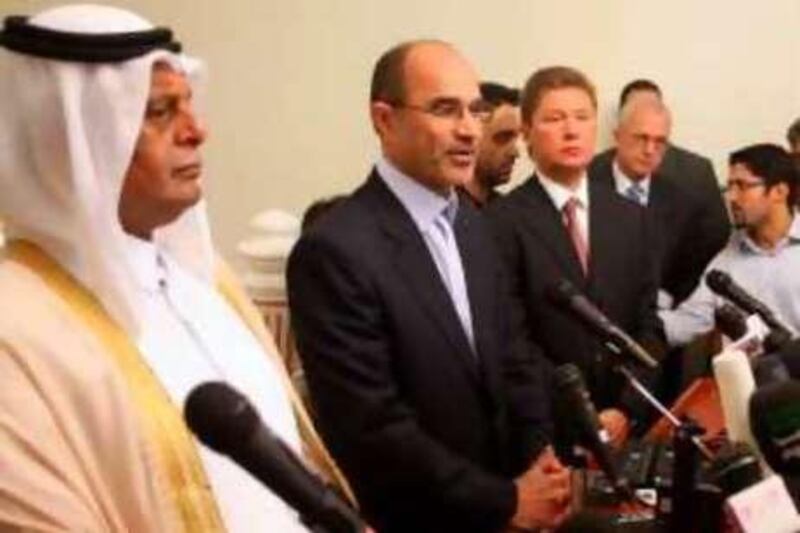TEHRAN // An Opec-style cartel for natural gas involving Iran, Russia and Qatar has received support from residents in Tehran but analysts doubt that such an organisation could be formed. The three countries, the world's top gas producers, met in Tehran this week to discuss the plan, which has been criticised by the European Union.
The three countries announced the formation of a "gas troika" and said the body would meet several times a year to discuss key issues, but Tehran hinted it could be taken a step further. "There is a consensus to set up a gas Opec," Gholam Hossein Nozari, Iran's oil minister, told a joint press conference in Tehran on Tuesday. Some analysts said due to the major differences in the nature of exporting gas and oil, the formation of an Opec-like organisation is not feasible.
"Gas is difficult to transport and producers have to invest billions of dollars to lay pipelines or build liquefaction plants to transport it while transporting oil doesn't entail such costs for producers," said Narsi Ghorban, an oil and gas expert and the director of the International Institute for Caspian Studies. "Gas export contracts have to be based on long-term agreements with prices based on a formula that is kept for many years.
"On the other hand, it is the producers who decide on prices and it is exporting countries like Russia who have created crises in Ukraine and other countries by increasing prices," he said. Mr Ghorban said he would rather suggest the formation of an organisation of gas producer and consumer countries that would discuss all financial, technological and legal issues related to gas trade and find ways of creating a win-win scenario for all.
This week's meeting in Tehran was the latest in a series of moves towards the formation of such a group since the idea was first raised in Jan 2007. Iran is now the world's fourth largest producer and consumer of natural gas. Household and industrial gas demand is high and to meet the demand the country now imports more gas from Turkmenistan than what it exports to Turkey. Iran also uses a considerable amount of gas to inject into oil fields to enhance oil production.
Tehran has gained a reputation for trying to influence energy markets, and Mr Nozari said yesterday Opec should take two million barrels a day off the market when it meets today. Some Iranians seem to be more worried about the ability of the country's gas production facilities to meet domestic demands. "The government should first ensure we have enough production to meet our own needs so that the gas shortage people and industries experienced last winter when Turkmenistan cut its gas supply to us won't happen again," said Fatemeh Khayyat, 36, a housewife.
The plan does have some support from residents in Iran. "It is a great idea to form an organisation to protect our interests when we sell our gas. Our oil and gas resources won't last forever so we should sell them at the highest price we can to be able to build our country," said Hossein Akbarshahi, 62, a retired armed forces employee. But Mr Akbarshahi said Iran should be careful about which partners it chooses.
"The Russians look like friends and supporters one day and the next, after they use the situation as a bargaining chip in their deals with the West, they turn their backs on us. I suspect they are not very sincere even now that they are talking about this so-called gas troika and want to use this to scare gas consuming countries in the West," he said. Europe - which counts on Russia for nearly half of its natural gas imports - also has concerns about the motives behind the proposed organisation, with most apprehensiveness aimed at Moscow.
Ferran Tarradellas, a spokesman for the European Commission's Directorate-General for Transport and Energy, said: "In principle, the Commission is against cartels for the sale and marketing of products, and hydrocarbons are no exception to that. "We believe the best conditions for the sale of a product such as gas are a free and transparent market," Mr Tarradellas said. msinaiee@thenational.ae





